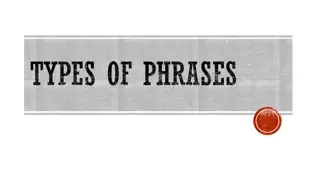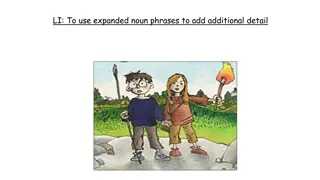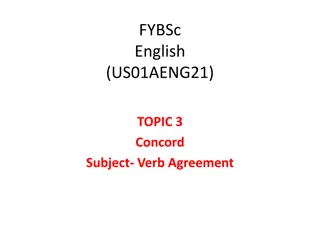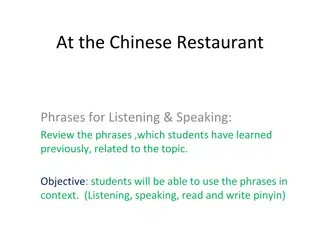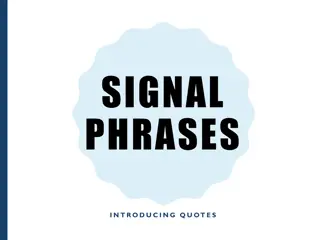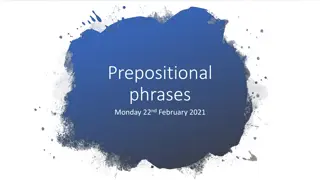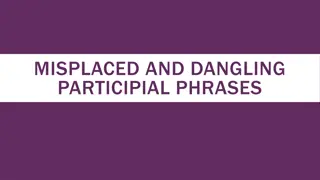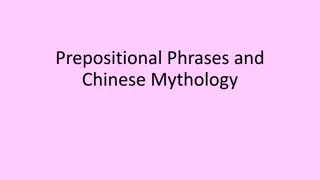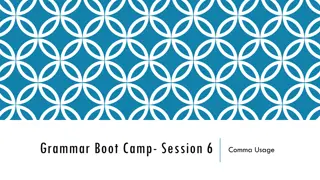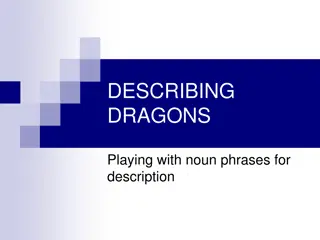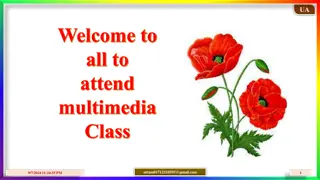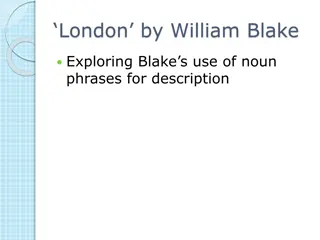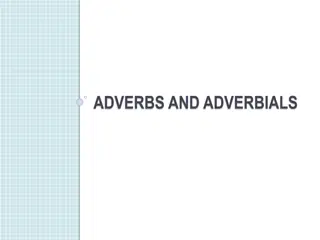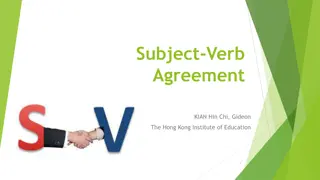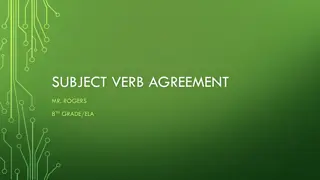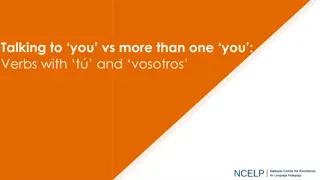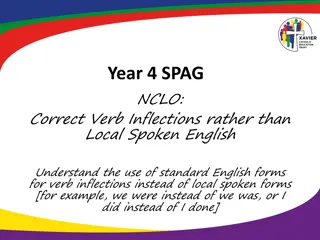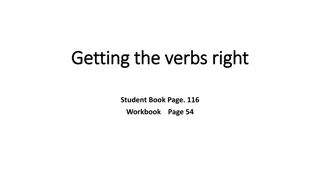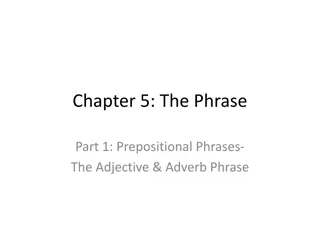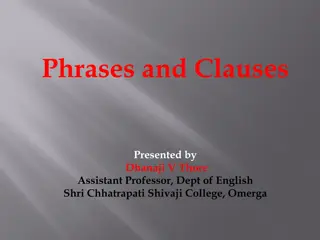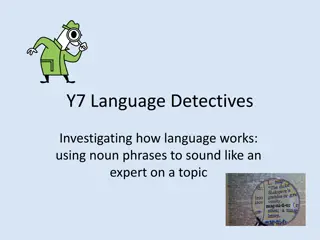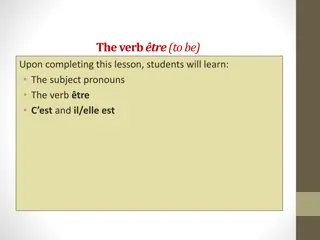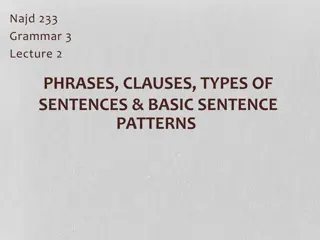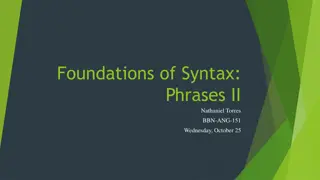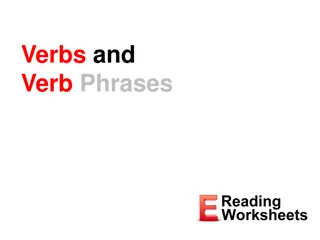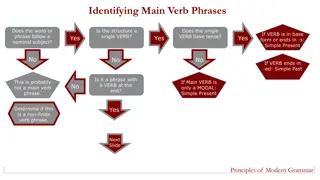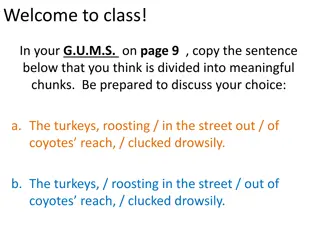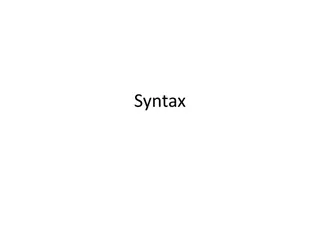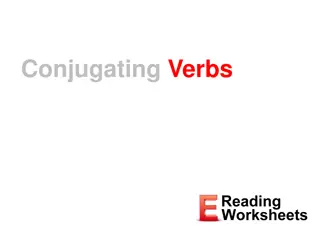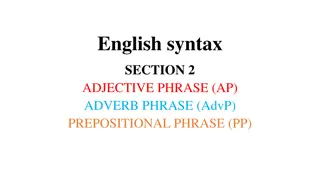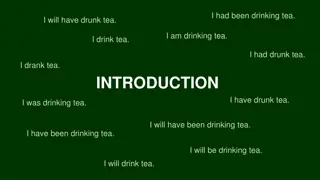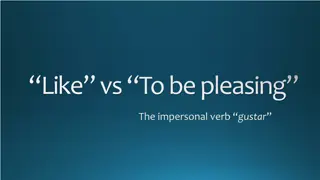Different Types of Phrases in English Grammar
Explore the various types of phrases in English grammar, including noun phrases and adjectival phrases. Learn how modifiers can come before or after the noun in a phrase, and practice identifying these phrases in sentences. Enhance your understanding of grammar with clear examples and explanations.
1 views • 12 slides
Enhancing Descriptions with Expanded Noun Phrases
Learn how to transform simple noun phrases into detailed descriptions by adding adjectives to create expanded noun phrases. Explore examples and engage in an activity to practice using expanded noun phrases to describe characters effectively.
0 views • 6 slides
Subject-Verb Agreement in English Sentences
Subject-verb agreement is crucial in English grammar to ensure sentences are grammatically correct. The subject of a sentence must agree with the verb in terms of gender, number, person, and case. Incorrect use of verb can lead to ungrammatical sentences. Learn how the subject and verb should match
0 views • 28 slides
Verb Forms and Tenses in English Grammar
Learn about verb forms and tenses in English grammar, including the five forms of every English verb, the differences between regular and irregular verbs, and how to use verb tenses such as present, present perfect, and present participle. Discover how to apply present tense in various contexts and
2 views • 15 slides
Mastering Subject-Verb Agreement for Clear Communication
Understanding subject-verb agreement is essential for clear and effective communication. Ensure that your subjects and verbs align in number, even when interrupted by phrases. Learn to identify and handle disruptive word groups, and grasp the rules for using "and" and "or" correctly. This guide help
0 views • 20 slides
Chinese Restaurant Phrases for Listening & Speaking Review
Review previously learned phrases related to Chinese restaurant interactions. Students will practice identifying items, speaking phrases, categorizing words, and writing about their dinner in pinyin. Various activities and tasks enhance listening, speaking, reading, and writing skills in an engaging
2 views • 13 slides
Mastering the Art of Introducing Quotes with Signal Phrases
Understanding the importance of signal phrases in academic writing. Signal phrases provide context, establish credibility of sources, and prevent dropped quotes. Learn the key elements required for an effective signal phrase and how to structure them using different formulas. Enhance your writing by
1 views • 16 slides
Prepositional Phrases and Their Usage
Prepositional phrases play a crucial role in describing the position, time, and manner of actions. This content explains the functions of prepositions, examples of prepositional phrases, and how to identify them in sentences. It also covers the definition of prepositions, examples of prepositions, a
0 views • 14 slides
Participial Phrases: Usage and Examples
Learn about participial phrases, their correct usage, and examples of both correct and incorrect placements. Explore how participial phrases modify nouns in sentences and how to identify and correct misplaced or dangling participial phrases.
2 views • 11 slides
Prepositional Phrases in Chinese Mythology
Explore the concept of prepositional phrases in the context of Chinese mythology. Learn about phrases, clauses, and how prepositions function in describing relationships within myths like the story of Nuwa and Fuxi. Identify prepositions, understand the formula for prepositional phrases, and discove
5 views • 7 slides
Mastering Comma Usage in Grammar: Session 6 Boot Camp
Learn how to effectively use commas in your writing for introducing, connecting, and separating elements. Discover the nuances of adding commas after introductory elements like words of address, verbal phrases, and prepositional phrases. Avoid common mistakes such as placing commas incorrectly befor
1 views • 16 slides
Mastering Noun Phrases for Vivid Descriptions
Explore the art of crafting compelling noun phrases to vividly describe dragons and other fantastical creatures. Learn techniques such as using determiners, hyphenated adjectives, prepositional phrases, similes, and relative pronouns to create imaginative and detailed descriptions. Elevate your writ
0 views • 15 slides
Subject-Verb Agreement in English Grammar
In this multimedia class session, Assistant Head-teacher Uttam Adhikary introduces the concept of subject-verb agreement, emphasizing the importance of matching singular subjects with singular verbs and plural subjects with plural verbs. Through engaging examples and presentations, students will lea
1 views • 41 slides
Analysis of William Blake's Use of Noun Phrases in "London
Exploring William Blake's poem "London," this analysis focuses on the use of noun phrases to describe people, places, objects, and emotions. By examining the nouns chosen by Blake and the patterns they form, we gain insight into the vivid and evocative imagery he creates. The expanded noun phrases i
1 views • 4 slides
Adverbs and Adverbials in English Grammar
Adverbs modify various elements in a sentence, such as verbs, adjectives, and even whole clauses. Not all adverbs end in "ly," and they can belong to categories like time, place, degree, and discourse markers. Adverbials are strings of words that modify functions, including prepositional phrases, no
1 views • 9 slides
Subject-Verb Agreement in English Sentences
Explore the concept of subject-verb agreement through examples about the human body. Learn about singular and plural nouns affecting verb usage, common patterns in verb endings, and exceptions to verb conjugation rules in English sentences.
0 views • 15 slides
A Guide to Subject-Verb Agreement Basics
Understand the essentials of subject-verb agreement in sentences. Learn how singular subjects match singular verbs and plural subjects pair with plural verbs. Discover key rules, including handling words between the subject and verb, dealing with prepositional phrases, and recognizing subject placem
1 views • 7 slides
English 2nd Paper Class Lesson on Verb Conjugation
This English 2nd paper class lesson focuses on verb conjugation. The lesson covers the formation of verbs, changes in verb tenses, and provides examples of strong, weak, and same formation verbs. Students will enhance their understanding of verb structures through this interactive session. Homework
1 views • 11 slides
Spanish Verb Endings for Addressing One Person vs. Multiple People
Spanish uses different verb endings for addressing one person (tú) and multiple people (vosotros). This resource provides examples of regular Spanish verbs with endings for one person and more than one person, as well as exercises to practice identifying the correct verb forms. Visual aids and enga
0 views • 21 slides
Verb Phrases: Main and Helping Verbs Explained
Learn about verb phrases composed of main and helping verbs, with examples like "might have eaten" and "will read." Discover words that can function as both main and helping verbs, and understand when helping verbs can be separate from main verbs in a sentence. Explore the nuances of verb usage for
4 views • 30 slides
Verb Inflections in Standard English
Verbs are essential in language as doing words, representing actions and states of being. Verb inflections involve changes in form based on tense, number, and person. Standard English ensures clear communication by using correct verb forms. Practice identifying correct verb inflections for "to be" t
0 views • 14 slides
Mastering Verbs - Practice Exercises and Examples
Enhance your verb skills with practice exercises and examples related to verb usage in different contexts. Improve your understanding of verb tenses, forms, and usage through engaging activities and visual aids. Perfect for students looking to sharpen their verb skills in grammar and writing.
0 views • 8 slides
Adjective Phrases in English Grammar
Learn about adjective phrases in English grammar through examples and explanations. Explore how these phrases describe nouns or pronouns, answer questions like "What kind?" or "How many?", and usually follow the words they describe. Enhance your understanding with practice exercises and tips for ide
0 views • 27 slides
Phrases and Clauses in English Grammar
This content dives into the concepts of phrases and clauses in English grammar, presented by Assistant Professor Dhanaji V. Thore. It explains how a phrase is a group of related words lacking a subject and predicate, while a clause contains both a subject and a predicate to form a complete sentence.
1 views • 23 slides
English Phrase Structure: Analysis and Examples
Explore the morphosyntactic analysis of English phrases and the grammatical hierarchy, delving into sentence constituents, clauses, phrases, words, and morphemes. Learn about different types of phrases, their structures, and elements like modifiers, headwords, and grammatical markers, with illustrat
1 views • 30 slides
Mastering Noun Phrases for Expertise in Language
Explore the power of crafting precise noun phrases to elevate your expertise on any topic. Unveil the secrets of using nouns strategically to convey depth and authority in your writing. Dive into the world of language detectives and uncover the nuances of language through the lens of noun phrases. E
0 views • 10 slides
Subject-Verb Agreement in Grammar
Explore the importance of subject-verb agreement in sentences, where a singular subject requires a singular verb and a plural subject needs a plural verb. Learn how to match subjects and verbs correctly to maintain agreement. Discover tips, examples, and resources to enhance your grammar skills effe
0 views • 73 slides
Hebrew Verb Forms: Qal Qatal and Piel Qatal Paradigms
Explore the rules and nuances of using definite articles with prepositions, verb forms, and verb charts in Hebrew. Learn how to identify and read the Qal Qatal and Piel Qatal paradigms, and understand the significance of prepositions with the definite article. Dive into verb charts for Qatal and dec
0 views • 25 slides
Mastering French Verb "Être" - Lesson Overview and Practice Exercises
This lesson focuses on the irregular verb "être" (to be) in French. You will learn about subject pronouns, conjugation of the verb, and how to use "c'est" and "il/elle est". Practice exercises are provided to reinforce your understanding. By the end, you'll be confident in using this essential verb
0 views • 5 slides
Phrases, Clauses, and Sentence Types in Grammar
A phrase is a group of words within a clause that conveys meaning, such as noun phrases, verb phrases, adjective phrases, adverbial phrases, and prepositional phrases. Clauses are groups of words containing a subject and a verb, with independent and dependent clauses being the two main types. Indepe
2 views • 33 slides
Verb Phrases in Syntax
In this study, we delve into the intricacies of verb phrases within the realm of syntax. Starting with the basic structure of the Verb Phrase (VP), we explore intransitive and transitive verbs, their expansion with adverbs, prepositional phrases, and direct objects. By analyzing examples and discuss
0 views • 23 slides
Verbs and Verb Phrases
Verbs express actions or states of being, while helping verbs indicate time. By combining with helping verbs, verb phrases are formed. Examples and explanations are provided to make learning about verbs and verb phrases easier.
1 views • 9 slides
Main Verb Phrases
This guide provides a detailed overview of identifying main verb phrases in sentences. It covers key aspects such as the structure, tense, presence of modals, auxiliaries, and exceptions to consider when determining the main verb in a sentence.
0 views • 4 slides
Clauses and Phrases in Grammar
Learn about the key distinctions between phrases and clauses in grammar, including prepositional and verb phrases, independent and dependent clauses, and how they function within sentences. Gain insight into how these fundamental building blocks of language contribute to sentence structure and meani
0 views • 12 slides
Syntax in Linguistics
Words in a language are organized into phrases and clauses with specific syntactic categories like Noun Phrase, Verb Phrase, and Adjective Phrase. Each phrase has a head such as a noun, verb, or adjective, and phrase structure rules help diagram the syntactic structure. Clauses are the largest units
0 views • 20 slides
Verb Conjugation in Grammar
Explore the world of verb conjugation in grammar, from changing verb forms to show time and tense to ensuring subject-verb agreement. Learn about helping verbs, statements contrary to fact, and how verb conjugation indicates completion. Dive into this essential aspect of language to enhance your und
0 views • 18 slides
English Adjective and Adverb Phrases
The structures and components of adjective phrases and adverb phrases in English syntax. Learn about pre-modification, complementation, modifiers, and correlative structures within these phrases. Gain insights into how adverbs and adverb phrases function as specifiers and modifiers. Delve into the d
0 views • 19 slides
Learning About Verb Tenses
The world of verb tenses, from past to future, simple to continuous, and perfect forms. Understand how verbs like "be," "do," and "have" function in sentences, and practice identifying ordinary and auxiliary verbs. Dive into verb tense names and self-evaluate your understanding with exercises on ver
0 views • 8 slides
Mastering Subject-Verb Agreement for Better Writing
Learn how verbs should agree with their subjects in number, whether singular or plural. Understand the difference between singular and plural verb forms with examples. Discover when to use singular verb forms (ending in "s") with singular subjects like "he," "she," or "it," and when to use plural ve
0 views • 9 slides
Impersonal Verb Gustar in English and Spanish
Structure and usage of the impersonal verb "gustar" in English and Spanish, focusing on the concept of being pleasing and its application in sentences. Learn about the subject-verb-object structure, conjugations, and how to express likes and preferences using this verb. Dive into examples and visual
0 views • 8 slides
